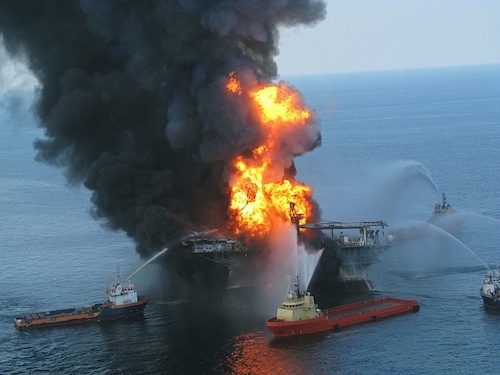With record criminal settlement reached over Gulf disaster, what lies ahead for BP and its victims?

The oil giant BP announced yesterday that it reached a settlement with the U.S. Department of Justice and the Securities and Exchange Commission in the criminal case over its 2010 oil spill in the Gulf of Mexico.
BP will pay DOJ $4 billion over a period of five years, and $525 million to the SEC over three years to resolve claims related to the Deepwater Horizon disaster, which killed 11 workers and injured 17 others. The payments include a $1.26 billion criminal fine, the biggest in U.S. history for the worst oil spill in industry history.
"We apologize for our role in the accident, and as today's resolution with the U.S. government further reflects, we have accepted responsibility for our actions," BP CEO Bob Dudley said in a Nov. 15 statement.
As part of the record criminal settlement, which still requires federal court approval, BP has agreed to plead guilty to:
* 11 felony counts related to the 11 worker deaths;
* one misdemeanor count under the Clean Water Act;
* one misdemeanor count under the Migratory Bird Act, and
* one felony count of obstruction of Congress related to misleading communications about the size of the spill.
The company will serve five years of probation. Meanwhile, some BP managers are facing separate criminal charges. A grand jury indictment handed up this week charged site leaders Robert Kaluza and Donald Vidrine with 22 counts of manslaughter for failing to shut down the Macondo well after tests showed it was in danger of failure, and for criminal violation of the Clean Water Act. David Rainey, BP's former vice president of Gulf exploration, was also charged with obstruction for giving Congress misleading estimates of the spill's magnitude. The criminal investigation is ongoing.
"The explosion of the rig was a disaster that resulted from BP’s culture of privileging profit over prudence; and we allege that BP’s most senior decision-makers onboard the Deepwater Horizon negligently caused the explosion," Assistant U.S. Attorney General Lanny Breuer said at a press conference about the DOJ settlement.
Under the agreement, BP will also pay $2.394 billion to the National Fish and Wildlife Foundation and an additional $350 million to the National Academy of Sciences over a five-year period. In addition, the company will take actions to improve the safety of its drilling operations in the Gulf.
While the record-setting size of the settlement got a lot of attention, not everyone was impressed. The public-interest watchdog group Public Citizen noted that the fines represent a small portion of the company's annual profits, which totaled $40 billion last year.
"The point of the criminal justice system is twofold: to punish and to deter. This does neither," Public Citizen said in a statement. "It is a weak-tea punishment that provides zero deterrence to BP or other companies."
On the day of the settlement announcement, BP's share price closed slightly up.
Questions remain over whether BP will be barred from federal contracting. The company is the Pentagon's biggest fuel supplier, with contracts worth $1.35 billion in 2011 alone. Under U.S. law, companies convicted of certain crimes can be blocked from doing business with the federal government. BP said it had not been advised of any debarment. Public Citizen has called on the government to restrict the company's access to future and current government oil and gas leases and to permanently bar it from federal contracts.
Despite its admission of criminal guilt for the disaster, BP said it intends to "vigorously defend" itself against remaining civil claims. Those include claims under the Clean Water Act, which could range anywhere from $3.5 billion to as high as $20 billion if the company is found guilty of gross negligence. In addition to the $9 billion in compensation to individuals and businesses the company has already paid out, a pending settlement of a class-action lawsuit is expected to cost the company another $7.8 billion.
But many Gulf residents are worried that the medical portion of the proposed class-action settlement will unfairly leave out many people sickened by pollution from the disaster. Dr. Mike Robichaux, a Louisiana physician who has treated over 100 cleanup workers, fishermen and other affected Gulf Coast residents, said the settlement does not cover many of the problems his patients are experiencing, including severe abdominal pain, headaches, memory loss, extreme fatigue, and muscle and joint pain.
BP has spent about $14 billion so far on disaster response and cleanup, and it will have to pay a still-undetermined amount for ecological restoration after completion of the Natural Resource Damage Assessment process under the Oil Pollution Act. Meanwhile, some of the 200 million gallons of oil BP spilled into the Gulf ecosystem continues to wash ashore, and an ongoing sheen near the disaster site has been traced to the failed well. Scientists have also documented lesions and deformities in sea life in areas affected by the spill.
"There's still a long road to restoration for the Gulf, and it's clear BP is gearing up for a big fight over the potentially much larger amounts of money that will fund environmental restoration," said Dan Favre of the Gulf Restoration Network.
(Photo of BP Deepwater Horizon fire by the U.S. Coast Guard.)
Tags
Sue Sturgis
Sue is the former editorial director of Facing South and the Institute for Southern Studies.
